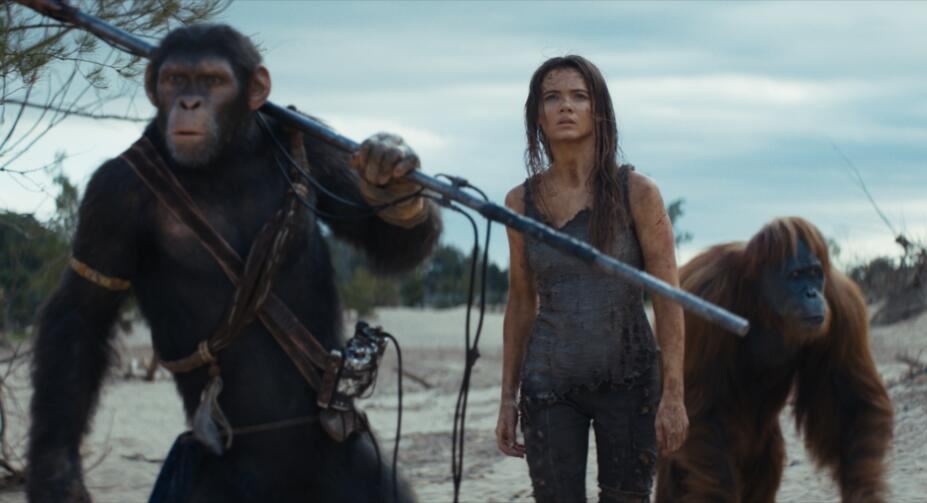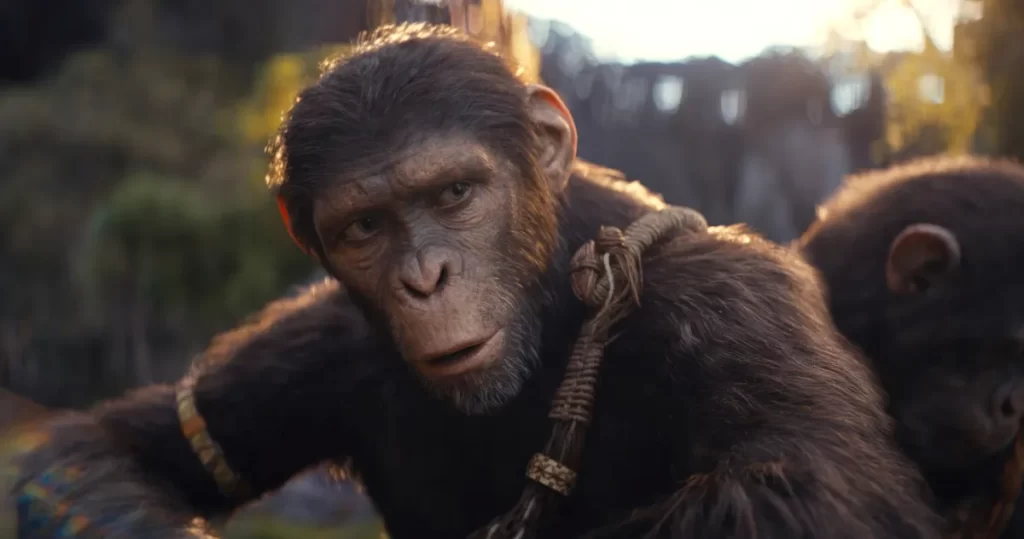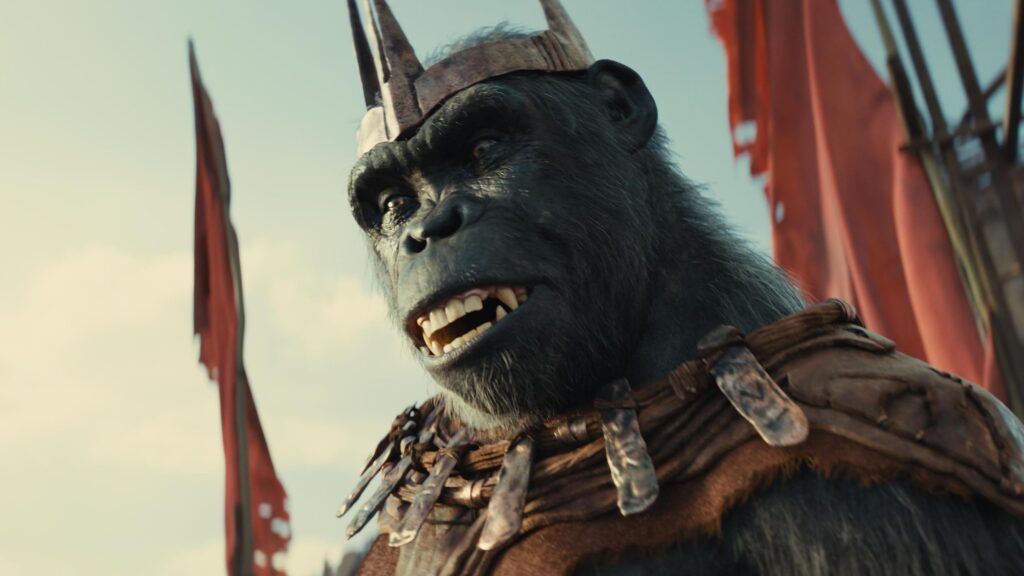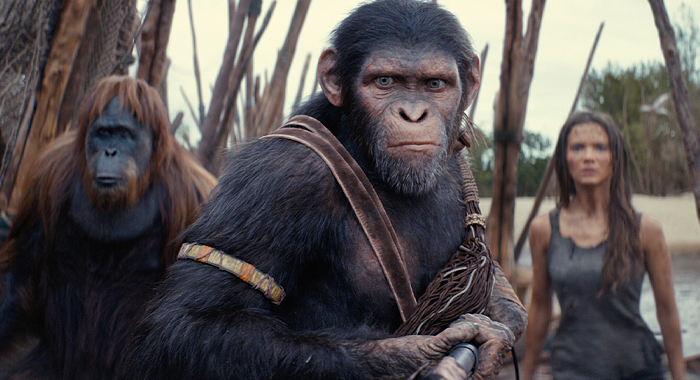
Whose side are you on? That was the key question posed by the most recent Planet of the Apes trilogy, which didn’t just chronicle an evolutionary shift where monkeys grew smarter as people got dumber; it framed humans as creatures of crudity and barbarism, thereby realigning our rooting interests to the hyperintelligent chimpanzees who warred against our own species. By the end of War for the Planet of the Apes, this battle appeared to be resolved; primates were now autonomous, while a devastating virus had crippled humans into a mute tribe of limited intellect. But in our era of IP churn, no franchise can remain dormant for long, and so now we have Kingdom of the Planet of the Apes, which takes place “many generations” after the events of War and which unfolds in a broadly post-human landscape. This means the issue is no longer whether we’re cheering for the monkeys or the men, but whether the simians selected as heroes can prevail versus foes who are also—in a biological sense—fellows.
This raises a more troubling question: Is Kingdom really a Planet of the Apes movie at all? On one level, the query is absurd; the troops of computer-generated monkeys clambering across the screen definitively establish that we’re located in the same cinematic universe where Charlton Heston screamed in anguish all those years ago (and, more recently, where Andy Serkis led an uprising on the Golden Gate Bridge). But despite some developmental tension—humans do in fact exist in this world, and while they’re generally regarded as inferior beings, some are less inferior than others—Kingdom is largely a portrait of intraspecies conflict, one that soberly violates the edict from the prior trilogy, “Ape not kill ape.” As a result, its story of tribal warfare and imperial conquest could mirror any number of historical pictures about rival clans. The warriors here just happen to be furrier than usual.

A cynic might argue that such a commercial enterprise only exists to make money (as opposed to everything else at the multiplex?), but Kingdom supplies an artistic justification: the continued enhancement of elegant motion-capture effects. Directed by Wes Ball (the Maze Runner films) from a script by Josh Friedman, the movie builds on its forebears as it blends physical performance with digital wizardry. There are times, such as during the opening climbing sequence, when the creatures on display appear somewhat weightless, gliding through the air with too much ease. For the most part, though, the apes look tangible, convincing, and—most importantly—expressive. When a minor character fails to summon the nerve to join his brethren on a perilous outing, we aren’t marveling at the filmmakers’ exquisite technique; we’re instinctively processing how his face contorts into a grimace of fear and shame.

Kingdom’s opening act suggests that Ball and his crew have wielded their mighty craftsmanship in service of a limp and tedious story. Our hero is Noa (Owen Teague), and he’s a very familiar sort: the precocious but diffident scion who yearns to substantiate his maturity but who also quails at the prospect of disappointing his father (Neil Sandilands), the apparent leader of their eagle-rearing tribe. Noa’s adolescent tribulations quickly prove insignificant once a band of bloodthirsty apes, clad in iron masks and brandishing electrified rods, lay waste to his village, killing or capturing most of his kin and leaving him for dead. When he awakens, he resolves—in a hardening effectively symbolized by his passing through a dark tunnel—to track down his family and topple his oppressors, setting the stage for a classical journey of self-discovery and vengeance.
This setup is nothing new, and despite the impressive computerized imagery, its execution here is vague and desultory. Forgive my animalistic bigotry, but many of the apes on screen look an awful lot alike, and it takes a good deal of time before they sharpen into characters. This becomes doubly problematic when it comes to action, as Ball choreographs his frenetic mayhem—the howls of pain, the blazes of fire—without properly delineating his combatants. It’s too generic to be disturbing.

It’s a rough start, but as Kingdom progresses, it acquires welcome layers of complexity and ambiguity. The pace picks up once Noa encounters Raka (Peter Macon), an orangutan who teaches him of the ways of Caesar, the erstwhile ape leader who attained political power in the earlier pictures by developing unifying slogans like “Apes together strong.” Yet if Raka speaks of Caesar with nigh-biblical reverence, treating his words as scripture, the same isn’t quite true of Proximus (Kevin Durand), the smiling despot who warps Caesar’s proverbs into a mandate validating his own tyranny. “He likes Roman history,” someone says of Proximus, and the script’s wrestling with the paradox of civilizational advancement—how empires can be built via the embrace of brutality and on the backs of slave labor—lends the movie surprising depth.
Proximus, for all his cheery bluster, is an obvious villain. Harder to pin down is Mae (The Witcher’s Freya Allan), the young human woman who surreptitiously follows Noa on his adventure. She’s the subject of the film’s best, most exhilarating sequence: a hushed chase through a meadow’s tall grass that owes evident debt to Spielberg’s The Lost World but which nonetheless delivers both blood-pumping thrills and character progression. That aside, Kingdom is an adequate genre exercise; a scene on a bridge (also aping Spielberg, this time vis-à-vis Indiana Jones and The Temple of Doom) is suspenseful, and the score (by John Paesano) is suitably rousing, but most of the action is more serviceable than electrifying.

This isn’t all that damning, given that the thematic crux of the movie is Mae, who proves more capable and cagey than the typical human of this ape-controlled realm. At various points, Noa and Mae seem to be enemies, allies, co-conspirators, and cross-purpose schemers; they are also never exactly any of these things, and the slippery nature of their ever-shifting relationship generates uncommon unpredictability. We are never quite sure what Mae is up to, even if we discern the lethality of her determination in a scary sequence on a rampart that’s gripping for its silence. Certain moments—the reveal of a MacGuffin rumored to possess the power to reshape society, the grasping of a pistol behind someone’s back—carry a charge that’s provocative because its implications are uncertain.
It’s a pity, then, that Kingdom of the Planet of the Apes sputters in its finale, delivering one of those obligatorily hectic climaxes that mistakes chaos for momentum. Cluttering the frame with incident, Ball seems to have determined that the more monkeys, the merrier. In so doing, he has befouled one of Caesar’s maxims. Forget solidarity; when it comes to cinematic excitement, apes together weak.
Grade: B-
Jeremy Beck is the editor-in-chief of MovieManifesto. He watches more movies and television than he probably should.
